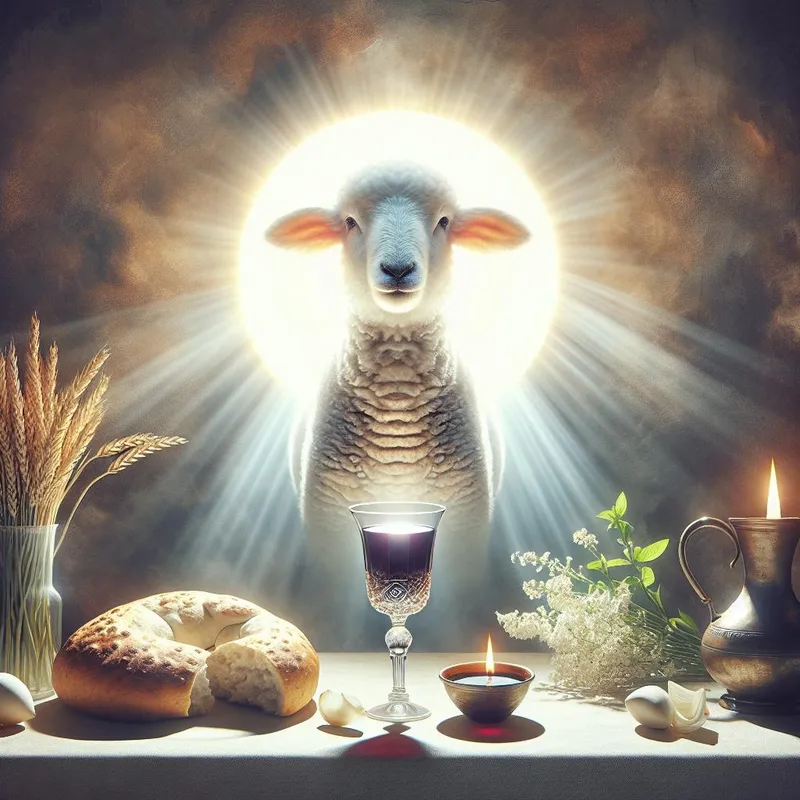
'The Divine Significance of the Passover Lamb: A Christian Reflection'
Posted on 08 June 2024
Passover Lamb
The Passover lamb played a significant role in the liberation of the Israelites from slavery in Egypt. According to Exodus 12:29, the Passover lamb was the animal that God instructed the Israelites to sacrifice on the night He struck down the firstborn sons of every household in Egypt. This devastating event was the final plague that God unleashed upon Pharaoh, ultimately leading to the release of the Israelites from their bondage (Exodus 11:1).
To commemorate their deliverance, God commanded the Israelites to observe the Passover Feast as a lasting memorial (Exodus 12:14). As part of this observance, each household was instructed to select a one-year-old male lamb without any defects (Exodus 12:5; Leviticus 22:20-21). At twilight, the head of each household would slaughter the lamb, making sure not to break any of its bones. They would then apply some of its blood to the tops and sides of their doorframes. The lamb would be roasted and eaten (Exodus 12:7-8).
God also provided specific instructions on how the Israelites were to eat the Passover lamb. They were to have their cloaks tucked into their belts, wear sandals on their feet, and hold their staffs in their hands. This was a symbolic representation of readiness for travel (Exodus 12:11).
The application of the lamb's blood on the doorframe served as a sign for God. When He saw the blood, He would pass over that particular home and spare it from destruction. However, any home without the blood of the lamb would have their firstborn son struck down that night (Exodus 12:12-13).
In the New Testament, there is a connection made between the Passover lamb and Jesus Christ. In 1 Corinthians 5:7, Paul refers to Jesus as the "Passover Lamb." John the Baptist also recognizes Jesus as the "Lamb of God" in John 1:29. Peter further emphasizes this connection by referring to Jesus as a "lamb without blemish or defect" (1 Peter 1:19), drawing upon the requirement for the Passover lamb to be without any flaws.
Jesus is qualified to be called the "lamb without blemish" because His life was completely free from sin (Hebrews 4:15). In the book of Revelation, John sees Jesus as a "Lamb, looking as if it had been slain" (Revelation 5:6). These references highlight Jesus' sacrificial death on the cross, which occurred during the time when the Passover was traditionally observed (Mark 14:12).
In the Christian faith, believers symbolically apply the blood of Christ to their hearts through faith. This act allows them to escape eternal death and find forgiveness for their sins (Hebrews 9:12, 14). Just as the Passover lamb's blood caused God to pass over each household, Christ's applied blood causes God's judgment to pass over sinners and grants them eternal life (Romans 6:23).
The significance of the Passover lamb and Jesus, the ultimate Passover Lamb, goes beyond physical liberation. In the same way that the Israelites were delivered from Egyptian slavery through the first Passover, believers are set free from the bondage of sin through Christ's sacrifice (Romans 8:2). This freedom is not temporary but offers a sure hope of eternal life (1 Peter 1:20-21).
Why This Matters
Understanding the symbolism and significance of the Passover lamb and its connection to Jesus Christ helps believers grasp the depth of God's plan for redemption. As Christians, we can appreciate how God's deliverance of the Israelites foreshadowed the ultimate deliverance through Jesus' sacrificial death on the cross. Recognizing Jesus as the Passover Lamb helps us comprehend the magnitude of His sacrifice and the forgiveness it offers for our sins.
Think About It
- Reflect on the significance of the Passover lamb in both the Old Testament and its connection to Jesus Christ. How does this deepen your understanding of God's plan for redemption?
- Consider how Jesus' sacrificial death as the Passover Lamb impacts your personal relationship with Him. How does it affect your understanding of forgiveness and salvation?
- Contemplate the symbolism of applying the blood of Christ to your heart through faith. How does this act demonstrate your trust in His sacrifice and its power to save you from eternal death?
